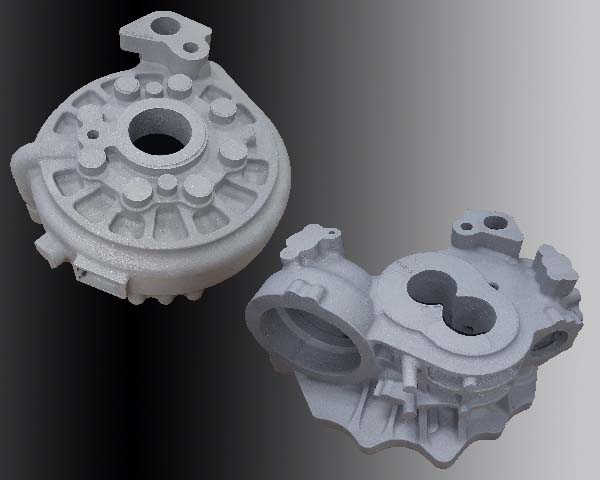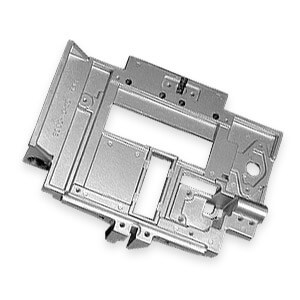Sustainability Factors of aluminum casting and Why It Matters
Discover the Benefits of Aluminum Casting in Modern Production
Aluminum casting has actually arised as a critical procedure in modern production. Its lightweight yet robust nature provides substantial advantages for numerous industries. The capability to attain intricate styles and keep limited resistances includes in its charm. Aluminum Foundry. In addition, the cost-effectiveness and environmental advantages make it a lasting option. As manufacturers look for innovative services, the function of aluminum casting remains to evolve. What specific applications and advantages wait for expedition in this vibrant field?
Lightweight Yet Strong: The Benefits of Aluminum
Several products are made use of in manufacturing, aluminum stands out due to its remarkable mix of light-weight buildings and exceptional strength. This unique quality makes aluminum an optimal option for various applications, specifically in markets such as vehicle, aerospace, and building and construction. Its low density permits simpler handling and transport, adding to reduced energy consumption throughout production and setting up processes.
Aluminum's strength-to-weight ratio is impressive, making it possible for producers to develop long lasting parts without adding unneeded mass. This characteristic is specifically useful in fields where weight decrease can result in improved fuel efficiency and total performance. Furthermore, aluminum's resistance to rust boosts the longevity of items, further strengthening its appeal in contemporary manufacturing.
Ultimately, the lightweight yet solid nature of aluminum placements it as a favored product, promoting technology and effectiveness across numerous sectors. Manufacturers progressively acknowledge that these advantages can result in substantial innovations in design and performance.
Precision and Complexity in Style
As manufacturers welcome the capabilities of aluminum casting, they find new opportunities for precision and intricacy in layout. This manufacturing process enables the production of elaborate forms and thorough functions that typical approaches typically battle to achieve. The fluidness of molten aluminum enables it to fill intricate molds, resulting in elements with limited tolerances and fine surface area coatings.
This precision is especially valuable in industries such as aerospace and automotive, where specific specs are vital for performance and safety. Aluminum casting also fits cutting-edge styles that improve functionality without compromising architectural honesty.

Cost-Effectiveness and Performance
Cost-effectiveness and efficiency are critical factors to consider for producers exploring aluminum casting as a production technique. Aluminum casting deals considerable expense advantages because of its lower material costs contrasted to other metals (Precision aluminum casting). The lightweight nature of aluminum minimizes shipping and handling expenses, and its superb thermal conductivity allows for quicker cooling times during the casting process, enhancing overall manufacturing rate
Aluminum's versatility allows manufacturers to create complex shapes and designs, reducing the need for additional machining or setting up. This streamlining of manufacturing not only minimizes labor prices but additionally reduces preparations, enabling companies to respond click over here now quickly to market needs.
Additionally, the durability and corrosion resistance of aluminum castings add to longer product life expectancies, minimizing replacement prices over time. As a result, producers can achieve an equilibrium of top notch output and decreased functional costs, making aluminum casting an increasingly eye-catching alternative in modern-day production.
Ecological Sustainability of Aluminum Casting
Aluminum casting sticks out as an eco lasting manufacturing option, particularly due to its recyclability and minimized ecological impact. The process allows for the effective use of aluminum, a material that can be recycled forever without shedding its properties. This particular significantly reduces the need for virgin aluminum, therefore minimizing and preserving natural sources power intake connected with extraction and processing.

Applications Across Industries: From Automotive to Aerospace
While varied sectors remain to look for innovative materials for manufacturing, aluminum casting has verified to be a functional remedy throughout fields such as automotive and aerospace. In the vehicle sector, aluminum castings add to light-weight car layouts, improving fuel effectiveness and performance. Elements like engine blocks, transmission housings, and wheels profit from aluminum's strength-to-weight proportion.
In aerospace, aluminum casting plays a significant duty in producing complicated components that need high sturdiness and reduced weight. Airplane components such as brackets, touchdown gear, and architectural structures make use of aluminum for peak performance and safety.
The flexibility of aluminum casting allows it to cater to other sectors, consisting of consumer electronics, aquatic, and commercial equipment. This flexibility not just meets the details requirements of numerous applications but also supports recurring development in manufacturing procedures. Consequently, aluminum casting continues to be a key player in contemporary production across many sectors.
Regularly Asked Questions
Just How Does Aluminum Casting Contrast to Other Metal Casting Processes?
Aluminum casting deals premium strength-to-weight proportions, visit homepage faster cooling prices, and superb corrosion resistance compared to various other steel casting procedures. These benefits make it ideal for numerous applications, enhancing efficiency and performance in manufacturing.
What Are the Typical Lead Times for Aluminum Casting Projects?
Common lead times for aluminum casting tasks vary from 2 to 8 weeks, relying on factors such as intricacy, order dimension, and manufacturing capability. Efficient preparation can aid reduce delays and improve job timelines.
Can Aluminum Casting Be Used for Intricate Styles?
Aluminum casting can without a doubt fit complex designs. aluminum casting. Its fluidity permits thorough patterns and forms, making it suitable for complicated elements in various markets. This convenience enhances design liberty while maintaining architectural integrity and performance
What Post-Processing Options Are Offered After Aluminum Casting?
Post-processing alternatives for aluminum casting include machining, polishing, surface treatments, anodizing, and welding. These methods enhance the coating, improve dimensional accuracy, and boost corrosion resistance, thus optimizing the final item's performance and visual charm.
Exactly How Do Temperature Level Adjustments Affect Aluminum Casting High Quality?
Temperature adjustments greatly effect aluminum casting high quality by affecting fluidity, solidification rates, and prospective defects. Rapid cooling can bring about enhanced brittleness, while excessive warm may trigger bending or incomplete dental filling of mold and mildews throughout casting.
Aluminum casting has actually emerged as an essential process in modern manufacturing. As suppliers accept the capacities of aluminum casting, they uncover brand-new methods for precision and intricacy in layout. Aluminum casting procedures normally create fewer greenhouse gas discharges compared to various other metal casting techniques. While diverse industries continue to seek ingenious products for production, aluminum casting has actually proven to be a flexible solution across sectors such as automobile and aerospace. In the automotive market, aluminum spreadings contribute to light-weight vehicle styles, boosting fuel effectiveness and performance.